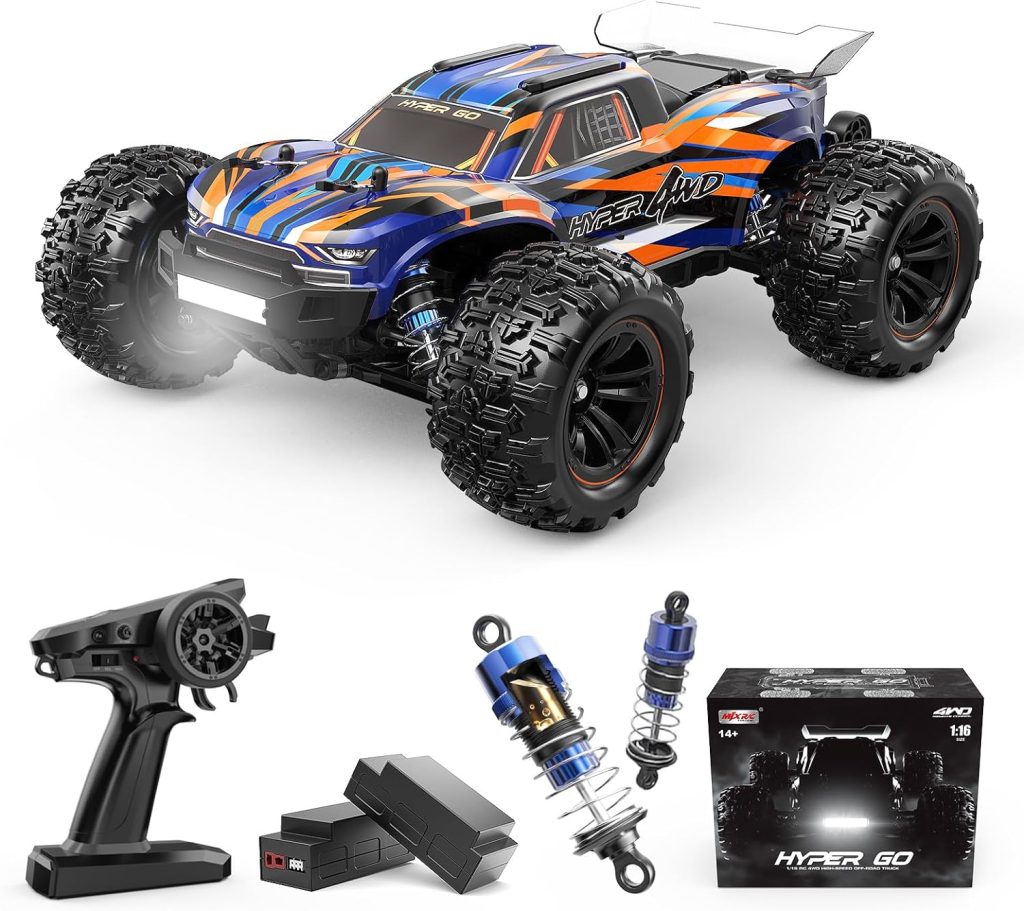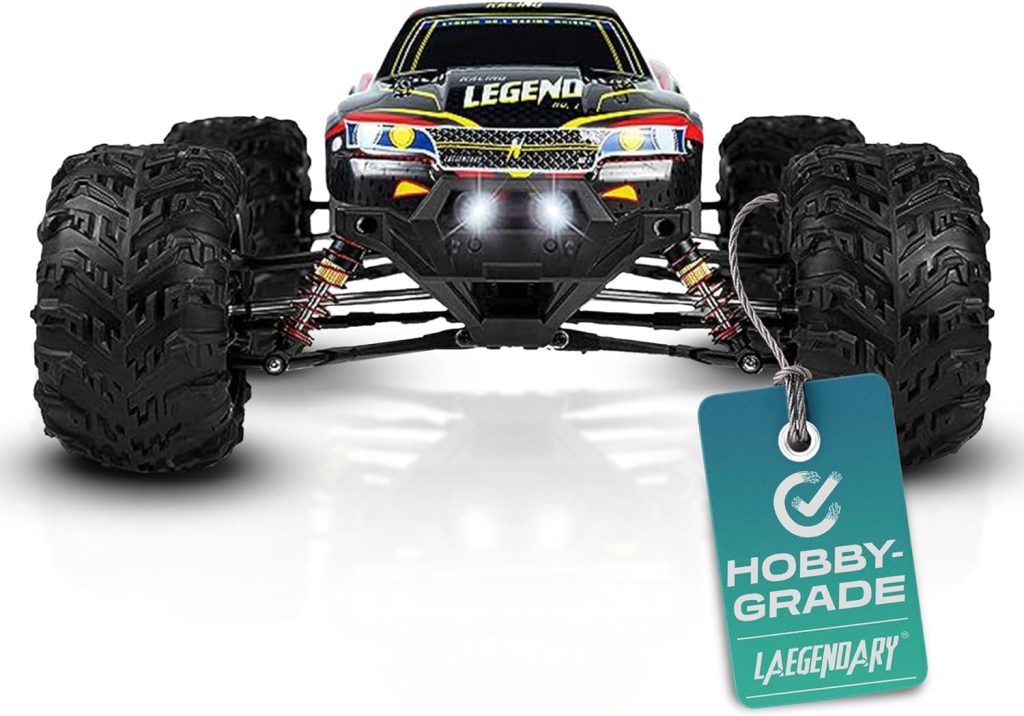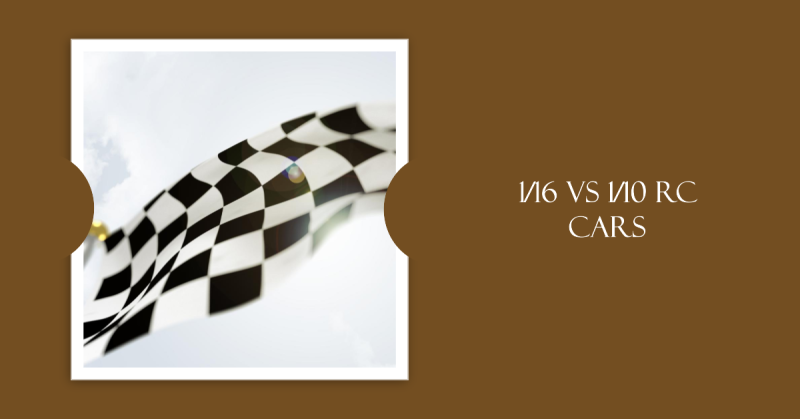Remote control vehicles provide fun for all ages. Hobby-grade RC cars now come in scales like 1/16 and 1/10. But which size RC is right for you? We compare major factors like speed, runtime, upgrades, parts availability, and more between these popular platforms.
Whether you’re new or experienced in RC cars, read on to see if a 1/16 scale or 1/10 scale is the better pick depending on driving environment, budget, and plans for upgrades.
Overview Comparison
Let’s kick things off with a general specs overview contrasting 1/16 and 1/10 RC cars:
| 1/16 Scale | 1/10 Scale | |
|---|---|---|
| Size | Smaller | Bigger |
| Speed | 25+ mph | 40+ mph |
| Run Time | 15+ minutes | 10-15 minutes |
| Price | More affordable | More expensive |
| Parts Availability | Less options | More options |
In a nutshell:
- 1/16 scale cars are smaller and slower, but run longer per battery and cost less money
- 1/10 scale cars are larger and faster, offer abundant parts availability, but are pricier
Dig deeper as we compare additional metrics around performance, upgradability, durability, and driving excitement across these platforms.
Detailed Comparison
1/16 HYPER GO RC Car

Size classes contain tradeoffs around functionality. We’ll analyze 1/16 versus 1/10 RC cars across over 20 key factors to determine their respective strengths and ideal usage scenarios:
Power & Speed Potential
Raw velocity provides excitement, but faster RCs demand expertise behind the controls:
Power Systems
- 1/16 scale: Smaller motors and battery components fit the chassis
- 1/10 scale: Larger motors and batteries for more output
Speed Capabilities
- 1/16 scale: Reach 25+ mph speeds out of the box
- 1/10 scale: Achieve 40+ mph with performance upgrades
Acceleration Rate
- 1/16 scale: Quick throttle response but mellower launch
- 1/10 scale: Powerful punch off the line
Thanks to bigger hardware and upgradability, 1/10 platforms ultimately provide more maximum performance potential. But 1/16 cars still go plenty fast for most users.
Winner: 1/10 Scale
1/10 LAEGENDARY RC Car

Battery Life & Runtime
Longer drive times between charges enhances the RC experience:
Battery Types
- 1/16 scale: Smaller 7.4V lithium packs
- 1/10 scale: Larger 11.1V lithium packs
Run Time
- 1/16 scale: Approximately 15+ minutes per charge
- 1/10 scale: Around 10-15 minutes depending on terrain
Recharge Time
- Slow chargers take 60+ minutes
- Fast chargers can replenish batteries in 15-30 minutes
Thanks to lower power draw, 1/16 cars last a bit longer between charges. But fast chargers help minimize downtime. Upgrade to high capacity packs for extended running regardless of scale.
Winner: 1/16 Scale
Ruggedness & Durability
RC vehicles often bang against obstacles, so you need proper protection:
Chassis Construction
- Durable plastic composite materials on both
- 1/10 has thicker, stronger chassis
Shock Absorption
- Fixed axle suspension on some 1/16 models
- Oil filled shocks standard on most 1/10 cars
Weatherproofing
- Light rain or snow ok; not fully waterproof
- Avoid heavy rain or puddle submersion
With beefier components and suspension, 1/10 has better durability for big jumps or crashes. But modern 1/16 cars take reasonable abuse too.
Winner: 1/10 Scale
Customization & Upgrades
While pre-built RCs are great out of the box, modifying for added power and style both the hobby and driving experience more personal:
Common Upgrades
- Improved batteries, motors, tires
- Some upgrades more available for 1/10 platforms
Compatible Parts
- 1/16 scale: Less aftermarket accessory options
- 1/10 scale: Huge array of hop-up parts
Appearance Personalization
- Interchangeable bodies, wheels, fins, wings
- More cosmetic choices for 1/10 cars
Thanks to widespread popularity in racing and bashing, 1/10 has essentially limitless upgradability and customization possibilities to make a ride your own.
Winner: 1/10 Scale
Cost Considerations
While remaining an enthusiast hobby, RC technology provides exciting functionality at reasonable prices these days:
Vehicle Pricing
- 1/16 scale: Quality models available under $100
- 1/10 scale: Expect to spend $250+
Ongoing Costs
- Batteries, tires, parts add up over time
- Generally lower for smaller 1/16 models
Cost Per Performance
- Initial buy-in favor 1/16 value, but 1/10 delivers more performance upside long term if investing further in upgrades
If chose wisely, both platforms offer lots capability for the money. But 1/10 requires a higher upfront budget and ongoing costs.
Winner: 1/16 Scale
Driving Experience
This catch-all section examines the joys and challenges around operating these radio controlled machines:
Handling & Control
- 1/16 scale: Very nimble through tight spaces
- 1/10 scale: More stable at higher speeds
Thrashing Potential
- 1/16 scale: Lower mass so less prone to breakage
- 1/10 scale: Heavy duty for big jumps and crashes
Learning Curve
- 1/16 scale: Easier for beginners to pick up
- 1/10 scale: Requires experienced driving skills
While perhaps counterintuitive, smaller 1/16 platforms enable easier low-speed maneuvering and present a gentler learning curve for RC newcomers. Durability improves in larger 1/10 vehicles for advanced drivers.
Winner: 1/16 Scale
Parts & Support Availability
Active user communities and abundant replacement components is vital for any hobby platform to thrive long term:
Spare Parts Ecosystem
- 1/16 scale: Less aftermarket parts production
- 1/10 scale: Huge array of hop-up and repair parts
Online Support Community
- 1/16 scale: Discussion forums have helpful peers
- 1/10 scale: Massive knowledge base and tuning advice
Local Hobby Shops
- Both typically stock parts for popular models
- But 1/10 has wider inventory and expertise
The 1/10 space has great maturity with deep supply chains and experienced enthusiasts eager to help newcomers. 1/16 is making strides but has more limited peer resources.
Winner: 1/10 Scale
Determining the Right Scale RC Car
With so many factors compared between these platforms, recommending an ideal scale comes down to driving environment and budget:
Best RC Car Scale for Beginners
For those just discovering the hobby, 1/16 provides an accessible starting point to learn car control. Lower speeds and smaller sizes make them perfect to bash around the house or yard worry-free.
Best RC Car Scale for Racing
Competitive RC racers need 1/10 scale to keep up with the higher velocities and performance the class demands. Their advanced skills can exploit the big power and abundant tuning options.
Best RC Car Scale for Bashing Around
For back yard and skate park driving antics without formal racing, either 1/16 or 1/10 provides big fun depending on space constraints and budget. Got lots of room and cash? Go big with 1/10 bashing excitement. For smaller areas or budgets, 1/16 gets the playtime job done wonderfully as well.
Ultimately personal preference, experience level, and budget determine which scale RC car suits you best rather than absolute performance advantages of one over the other. Both platforms provide an awesome introduction to the RC hobby.
Final Verdict: Which RC Car Scale Wins?
Based on our detailed comparison, choosing between 1/16 and 1/10 RC cars comes down to an experience versus value proposition:
- 1/16 scale cars win for beginners thanks to cheaper entry pricing and more forgiving driving dynamics to learn. Their smaller size also makes in-house use practical.
- But 1/10 scale takes the crown for enthusiasts hungry from maximum scale speed and upgrade potential. Their established platform offers unmatched aftermarket accessories and knowledgeable communities.
Whichever scale you choose, modern hobby-grade RC cars deliver exciting speed and technology at reasonable prices for all ages to enjoy. Determine the right size based on your budget, available space, and desire to customize or eventually race at higher levels. Both 1/16 and 1/10 platforms provide awesome introduction to RC action.
